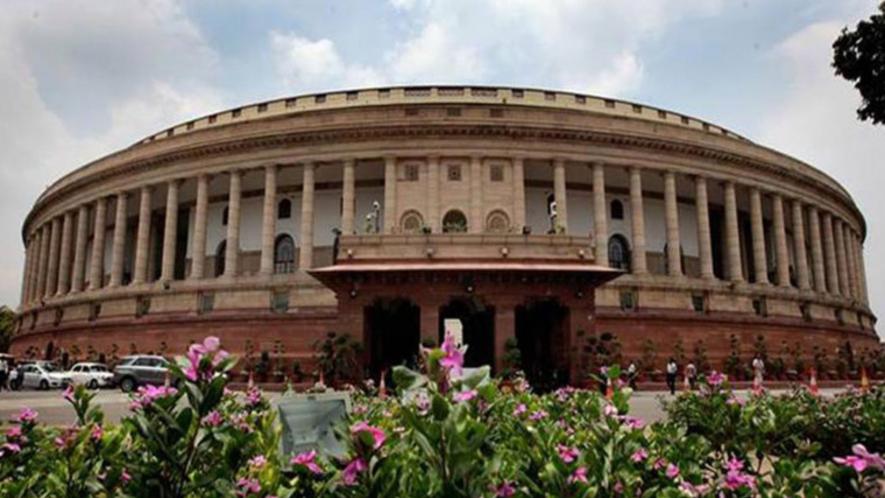In Parliament Special Session, MPs Must Hold Government to Account

Representational Image. Image Courtesy: PTI
On Thursday, Minister for Parliamentary Affairs Pralhad Joshi announced a “special session” of Parliament from 18 to 22 September with just five sittings. True to form, the minister’s declaration of this short session on Twitter aspired for “fruitful” debates and discussions and referred to “Amrit Kaal”, a ruling party description of its time in power. Oddly, the minister did not announce why the Lok Sabha is scheduling its 13th Session, and the Rajya Sabha its 261st, all of a sudden.
The mystery created by the government has left the media and political circles feeling stranded, and possible motives behind the special session are being speculated, as expected. Some Opposition leaders have surmised that the government might want to legislate for simultaneous Lok Sabha and State Assembly elections. Others expect a legislation on the Uniform Civil Code or a law to reserve 33% of seats for women in the Lok Sabha and State assemblies.
A Congress Member of Parliament has said that if the Opposition parties stall the government’s proposals, Prime Minister Narendra Modi and his party would mobilise public opinion against them by calling them partisan or worse. Congress leader Abhishek Manu Singhvi told the Indian Express that the sudden announcement is “typical over-dramatics” of the Modi-led regime, which sets the agenda by keeping its motives under wraps and then allowing selective “leaks”.
Constitutional Provisions, Rules and Precedents
Whatever the motives of the government, the rules and some precedents throw adequate light on how decisions related to special sessions have been taken in India.
Article 85 of the Constitution deals with the summoning Parliament’s sessions and their prorogation and dissolution. It provides for the President of India to summon each House of Parliament to meet “from time to time”, and mandates that two successive sessions are held within six months of each other. It is also constitutionally mandated that the President functions on the aid and advice of the Prime Minister.
Therefore, the President summons Parliament sessions but the government, led by the Prime Minister, actually call the sessions into action.
Rules for Emergent Parliament Sessions
A plain reading of Article 85 makes it clear there is no provision for a “special” session. However, Rule 3 of the Rules of Procedure and Conduct of Business in the Lok Sabha is derived from this Article It says that summons could be issued to Members of Parliament to attend an emergent Lok Sabha session. The corresponding rule for the Rajya Sabha is also Rule 3, with the same provision for an emergent session.
The Rule states, “The Secretary-General shall issue a summons to each member specifying the date and place for a session of the House: Provided that when a session is called at short notice or emergently, summons may not be issued to each member separately but an announcement of the date and place of the session shall be published in the Gazette and made in the press, and members may be informed by telegram.”
Therefore, the “special” session in Pralhad Joshi’s Twitter announcement possibly refers to a session “called at short notice or emergently”.
Past Emergent Sessions
The book, Practice and Procedure of Parliament, by MN Kaul and SL Shakdher is considered an authentic source for rules and precedents on the functioning of Parliament. Save some notable exceptions, it makes no explicit references to governments convening special sessions.
For example, it refers to a special session of the Uttar Pradesh Assembly convened in 1998 on the orders of the Supreme Court. The court had explicitly ordered that the sole agenda of that session would be “conducting a Composite Floor-Test to decide upon….who among the two claimants to the post of Chief Minister [Kalyan Singh and Jagdambika Pal] enjoyed the majority support of the House”.
Kaul and Shakdher write, “The order of the Supreme Court introduced the concept of Composite Floor-Test, though the Rules of Procedure do not provide for such a test.”
Another special six-day session of both Houses was convened when India commemorated the Golden Jubilee of independence. That session, held from 26 August to 1 September 1997, ended with both Houses unanimously adopting a resolution on the “Agenda for India”. Its stress was on ensuring transparency and accountability in public life, wider educational coverage, curbing corruption, prudent economic management and time-bound planning to achieve basic nutrition, health, potable water, sanitation, and shelter needs.
Emergent Session of 1975
On 21 July 1975, Parliament's session was convened. Then minister of works and housing and parliamentary affairs, K Raghuramaiah, while moving a resolution to suspend the Rules of Procedure and Conduct of Business in the Lok Sabha for transacting only government business described the session as in the nature of an emergent session.
Accordingly, the resolution barred all other business, including questions, calling attention or private members’ business from being transacted in the House. The Rules of Procedure were suspended “to that extent”.
The resolution was adopted and the Speaker did not allow the Opposition Members of Parliament to ask questions or use other procedural devices. Despite this, there were intense and emotional protests by Opposition MPs against the Emergency. In this session, on the next day, a Statutory Resolution for approval of the proclamation of emergency was adopted.
Special Session of 1976
More than a year and three months later, on 25 October 1976, another special Lok Sabha session was convened. In it, Raghuramaiah moved a resolution to consider the Constitution (Forty-second Amendment) Bill, 1976 and other “unavoidable government business”. The resolution barred any other business in the House and suspended the Rules of Procedure to that extent. The Amendment itself was the most controversial change in the Constitution so far, and it included additions such as “Fundamental Duties” and controls on the powers of the Supreme Court and high courts.
During the discussion on the Resolution, a Lok Sabha member moved an amendment that after the Bill was passed, the Speaker should allow members to call the attention of Ministers and give notices for short-duration discussions. That amendment was adopted with the government’s resolution.
All these developments, which occurred during the national Emergency imposed on 26 June 1975 and lasting for nineteen months, should serve as a reminder and a warning today. If Parliamentary Affairs Minister Pralhad Joshi has informed the whole nation of a special session of Parliament, it should share the reasons for it and certainly not bar Members of Parliament from transacting business as per the Rules.
Members of Parliament must be allowed to ask questions and use other parliamentary devices which play a crucial role in our democracy. Any attempt to water down the right to hold the government to account would negate the Constitution, Parliament and Indian democracy.
The author served as Officer on Special Duty to President of India K R Narayanan. The views are personal.
Get the latest reports & analysis with people's perspective on Protests, movements & deep analytical videos, discussions of the current affairs in your Telegram app. Subscribe to NewsClick's Telegram channel & get Real-Time updates on stories, as they get published on our website.
























